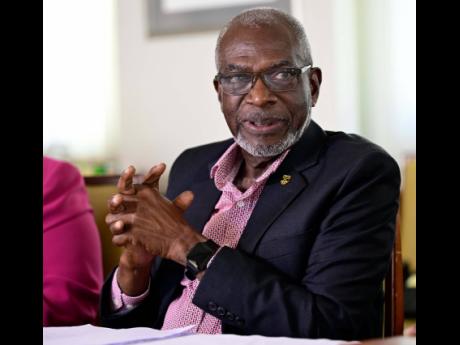BIG LEAD FOR PNP
Opposition party holds strong edge over JLP as political landscape shifts
For the first time in recent years, the opposition People’s National Party (PNP) has found itself with a notable lead over the governing Jamaica Labour Party (JLP), according to the latest Don Anderson opinion poll.
In the national survey, which captured voter intent, 36.8 per cent of respondents indicated that were a general election to be held shortly, they would vote for the PNP, versus 29 per cent who said they would vote for the JLP.
The figures amount to a 7.8 percentage-point lead for the PNP, a significant pull when compared to the one, three and five percentage-point leads the opposition party has been holding over the governing party in recent months.
Some 19.1 per cent of respondents remain undecided, while 15 per cent have indicated that they will not vote, according to the findings of the poll conducted by Anderson’s Market Research Services Limited between April 4 and 12 among persons 18 years and older who are eligible to vote.
The survey, which was commissioned by the PNP, has a margin of error of plus or minus three per cent. A total of 1,057 persons participated.
“We are encouraged by the findings. We’re not sitting on our laurels or complacent because of the findings. We’re encouraged to continue the work that we have been putting in to even increase on the lead that we currently have,” PNP General Secretary Dr Dayton Campbell said on Monday.
The Gleaner was not able to reach JLP General Secretary Dr Horace Chang for comment.
The latest figures are the clearest indication yet that the opposition party is finding its footing and represent a sharp reversal in its fortunes on the back of a tumultuous period, which resurfaced in 2016 following defeat in that year’s general election.
The party in the run-up to the September 2020 general election trailed the JLP by 12 percentage points, registering a favourability rating of 25 per cent to 37 per cent.
A year later in 2021, the JLP held a nine-percentage-point lead over the PNP, when 26 per cent of respondents in an RJRGLEANER-commissioned Don Anderson poll indicated that they would vote for the JLP, while 17 declared support for the PNP.
The PNP continued to trail the JLP in September 2022, this time by 13 percentage points with only 18 per cent of people in Anderson’s poll giving the party the nod when compared to the 31 per cent for the JLP.
But last September Anderson’s poll revealed that there would be a struggle for supremacy between the two main political parties if a general election were to be called at that time.
The PNP held the support of 29.5 per cent of respondents to the JLP’s 26.1 per cent after the conclusion of the poll, which had a margin of error of plus or minus three per cent.
It came amid an increase in cost of living, a then rising inflation rate and a downgraded growth outlook for Jamaica in the midst of an expected decline in global economic activity over the next two years.
Further, the latest findings come on the heels of the PNP’s significant inroads into voter support in the recently concluded local government elections, Anderson, a veteran pollster assessed, with the party claiming the majority vote, albeit in a record-low voter of 29 per cent.
The PNP won the popular votes with 311,716 to the JLP’s 290,283.
Anderson said support for the PNP comes as it traditionally does from older persons, with 40 per cent in the 35-33 age group, 40 per cent in the 45-54 age group and significantly 42 per cent among the oldest cohort of 65 years and over.
“But it is interesting to note that it (PNP) gets good support from the 18-24 age group, splitting the voter intent equally with the JLP in this category,” said Anderson.
He noted that over most of the polls conducted since 2016, the JLP has better support than the PNP in this young age cohort.
Anderson also pointed out that support for the PNP among both genders was stronger than that for the JLP.
Drivers of support for the PNP were based on two key factors, with 44 per cent indicating that they would vote for the party because it looks after the poor.
“Note should be taken of the fact that this was one of the pillars of support for the PNP during its long term of office between 1989 and 2007,” said Anderson.
Meanwhile, 39 per cent say they would vote for the PNP because it has the best track record of managing the country, 18 per cent believe the party has better social programmes, and tradition/loyalty rounded off the top four reasons for voting for the PNP with 17 per cent.
At the same time, support for the JLP came mainly from the 25-34 age group, where it leads the PNP by five percentage points.
Support for the governing party was driven by mainly three factors with 45 per cent indicating that they have the country’s interest at heart, 40 per cent noting that the party can manage the country better than the PNP, while 26 per cent believe that the JLP has been the party that has provided more jobs.

